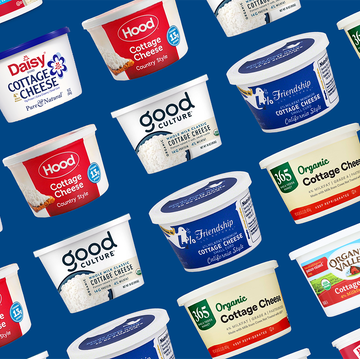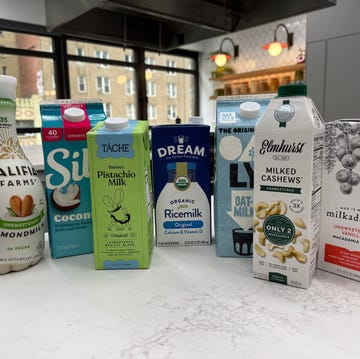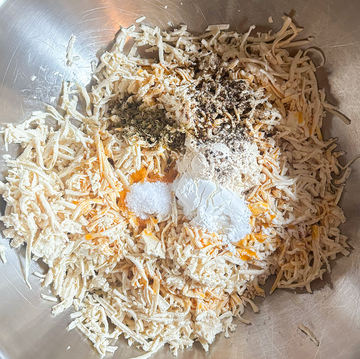I've adored cheese my entire life, but for health reasons, I needed to find low-lactose options. I scoured scientific studies and online advice but came away more confused than when I started. I decided to go to the experts to help me figure out exactly what to look for when digging through my grocer's cheese case. The main thing I learned? Getting older is a good thing in the world of low-lactose cheese.
What Makes Cheese Low In Lactose?
At the beginning of the cheesemaking process, roughly 96% of the lactose (a type of sugar) is removed when the whey is separated from the curds. Especially for hard cheeses, much of the lactose gets used up and broken down during early fermentation to create the right acidity level, Zoe Brickley from Vermont’s Jasper Hill Farm tells Delish.
But that’s not the only way to reduce the amount of lactose in cheese.
"Age matters," Cathy Strange, Whole Foods’ Ambassador of Food Culture and former cheese buyer, tells Delish. "If it doesn’t matter for anything else, it matters for low-lactose cheese." Strange explains that the cheese remains active, consuming its sugars as it ages. The more it ages, the more lactose gets removed.
Katlin Sautner from the dairy company Arla Foods (and self-described "curd nerd") tells Delish that as bacteria consume lactose during the cheesemaking process, they convert it into lactic acid, a key part of the fermentation process that helps develop flavor and texture. "The longer the cheese is aged, the more time bacteria have to break down any remaining lactose," she says. "This is why aged cheeses tend to have very low lactose content."
Even softer, fully-ripened cheeses are likely to have a negligible amount of lactose leftover, Brickley says. These cheeses, whether Brie or Jasper Hill's Harbison, for example, often have the same amount of lactose per serving as a single sip of milk. Still, trying out a hard, aged cheese before a softer, fully-ripened one is the smart choice, especially as you’re trying to figure out what works for you.
The Best Low-Lactose Cheeses
"Generally speaking, the longer the aging and/or fermentation process where less moisture is retained, the lower the lactose," says dietitian and health coach Jessica Cording. "While these cheeses may not be completely lactose-free, those with difficulties digesting lactose often find that they cause fewer symptoms of lactose intolerance." Young cheeses, high-moisture varieties, and non-cultured types (like cottage cheese) have a higher probability of lactose, so it's best to steer clear or enjoy those in moderation. Here are some of the best low-lactose cheeses.
Parmigiano Reggiano
Considered the lowest-lactose cheese available, Parmigiano Reggiano is typically aged a minimum of 12 months. Sure, it doesn’t melt the way other cheeses do, but if you’re searching for the lowest-lactose cheese, look no further than this Italian masterpiece, where an entire wheel of the product has less lactose than a glass of milk.
Aged Cheddar
The longer Cheddar ages, the less likely the lactose is to survive. While the world of aged Cheddar is broad, U.S.-made Cheddar is an excellent option. For example, Jasper Hill Farms’ Cabot Clothbound—a collaboration with another Vermont creamery, Cabot—is aged up to 14 months and constantly brushed, turned, and monitored for quality (and exceptional taste). Tillamook in Oregon has taken home plenty of worldwide awards for its aged extra sharp varieties.
Aged Havarti
Sautner says Castello, the largest producer of Havarti in the United States, offers a Havarti aged for 12 months that includes washing the curd to help remove lactose. By selecting the right cultures, she says cheesemakers can retain Havarti's signature "smooth texture" even when aged, allowing the cheese to melt well and add flavor to baked dishes. "Aged Havarti offers a rich, buttery flavor that intensifies with time," she says. "Its creamy texture and mild taste make it versatile for various dishes, from sandwiches to melted cheese toppings."
Goat Cheese
Goat cheese is most often seen fresh, but there are some unique aged varieties on the market, whether Cypress Grove’s Midnight Moon, aged for at least six months, or Capriole’s Old Kentucky Tomme, aged for eight months. These styles allow fans of goat cheese to experience something unique while reducing lactose. Sam Schad, general manager at Capriole, tells Delish that the chemical structure of goat's milk is different than cow's milk and contains less lactate protein. That’s good news for some people with lactose digestion issues who may have an easier time digesting goat milk.
Alpine Cheeses
For those looking to mix something new into their low-lactose cheese options, Alpine-style cheeses "should always be considered in the conversation," Strange says. These varieties all have a minimum aging of six months and retain some meltability with a rich flavor. "You are getting a lot of really good flavor bang for your buck," Strange says. Born in Europe but also common in the U.S., this style of aged cheese uses milk from cows grazing high in the mountains, giving the flavor a unique spin, whether seen in a Gruyère, Raclette (fondue, anyone?) or others, such as Jasper Hill Farm's Alpha Tolman variety aged 12 months with a mix of fruit and nut notes.
Manchego
Popular in Europe, sheep's milk has a different molecular structure compared to cow's milk. This makes aged sheep's milk cheeses, like the well-loved Manchego, an excellent choice for those avoiding lactose. "Cheeses made from sheep’s milk or goat’s milk are generally lower in lactose," Cording says. "These kinds of milk may have a slightly different protein structure and fat content, making them easier to digest for those sensitive to dairy." Incorporating aged Manchego will definitely elevate your low-lactose cheese board.
Aged Gouda
If you’re seeking a cheese that can melt while keeping lactose levels low, Strange recommends aged Gouda. Known for its rich, distinctive flavors and some pliability when melted, Gouda stands out as an excellent addition to your low-lactose cheese repertoire.
Swiss Cheese
Swiss cheese contains only trace amounts of lactose, says Lauren Manaker, M.S., R.D.N., L.D. "This makes Swiss cheese an excellent choice for those who experience difficulty digesting lactose," she says. "Additionally, its mild, nutty flavor and versatile use in dishes like sandwiches, soups or fondue make it a fantastic option for any cheese lover."












